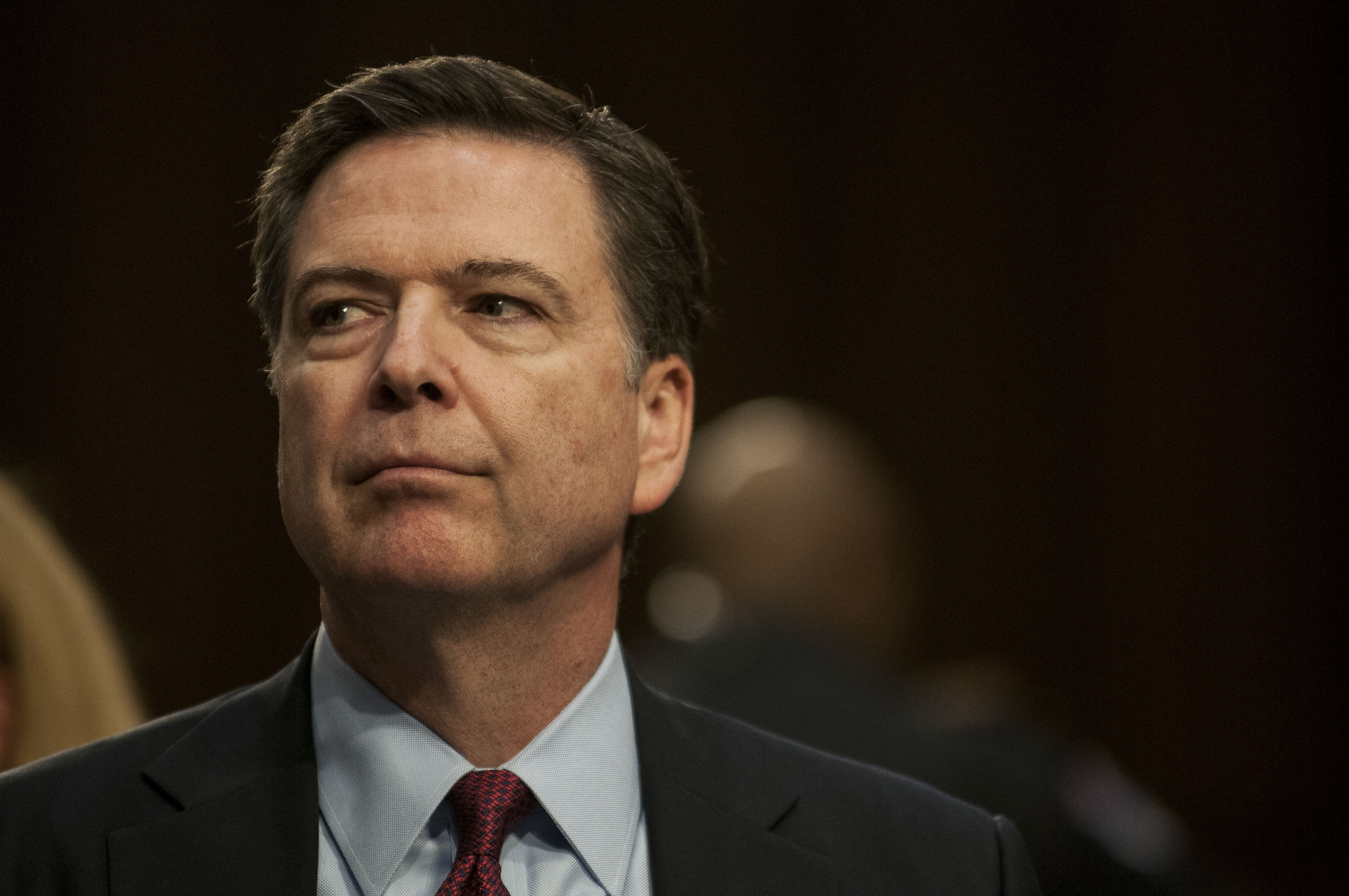The silver lining to James Comey's contentious letters
The FBI's cameo at the end of an already ugly presidential race may actually be a good thing for the two people with the most to lose


When FBI Director James Comey penned a letter to Congress 11 days before the presidential election, he certainly wasn't trying to do Hillary Clinton any favors. The letter, written to inform lawmakers about a cache of emails potentially "pertinent" to the dormant investigation into Clinton's use of a private email server, stalled the Democratic nominee's glide to victory and breathed new life into the flaming-out bid of her rival, Donald Trump. The damage was done, and Comey received his fair share of criticism. But there may well be a silver lining for Clinton in this debacle — and for Comey, too.
At the time of Comey's first letter, on Oct. 28, Clinton had a sizable lead over Trump. The question wasn't whether or not she'd win, it was by how much. By the time Comey sent his second letter to Congress on Sunday, confirming the new emails contained nothing to indicate criminality, Clinton's lead had dwindled to a near-tie, then stabilized at 3-5 percentage points, with significant uncertainty in the Electoral College.
It's hard to say how much of Clinton's electoral scare can be attributed to Comey's letter. After all, poll tightening is normal at the end of presidential races. But Nate Silver at FiveThirtyEight says "the pattern is at least consistent with a 'shock' caused by a burst of negative news for a candidate, as opposed to a more gradual decline." If Clinton hangs on to win, Comey's last-minute bombshell may still have cost Democrats their bid to take control of the Senate and make significant inroads in the House. Sam Wang, a fellow poll-wrangler at Princeton, estimates that Comey's intercession "may have cost Democrats between one and three Senate seats."
The Week
Escape your echo chamber. Get the facts behind the news, plus analysis from multiple perspectives.

Sign up for The Week's Free Newsletters
From our morning news briefing to a weekly Good News Newsletter, get the best of The Week delivered directly to your inbox.
From our morning news briefing to a weekly Good News Newsletter, get the best of The Week delivered directly to your inbox.
There is a lot to criticize in Comey's bizarre handing of the situation. John Flannery, a former federal prosecutor and special counsel to the House and Senate Judiciary Committees, called on Comey to resign immediately for showing a lack of leadership and poor political judgment. For the FBI director "to simply say — after a nine-day hurricane of news stories about Clinton's emails — that there was never anything to see here is a remarkable swing and miss on Comey's part," says Chris Cillizza at The Washington Post. Former Rep. Joe Walsh, an outspoken Clinton critic, noted that more than 20 million people voted between the release of Comey's first and second letters, adding, "I'm a Trump guy, but, man, that's not right."
It's true that Comey has burned bridges left, right, and center. If Bill Clinton's ill-advised meeting with Attorney General Loretta Lynch in June sidelined Lynch in the Clinton email saga, Comey just sidelined himself in any future Clinton investigation. His stepping into the race sparked a torrent of leaks from the FBI and Justice Department, with the FBI field office in New York looking particularly partisan against Clinton. "The FBI is Trumpland," one FBI agent told The Guardian.
At this point, "the Clinton campaign won't say much about Sunday's Comey announcement for fear of re-injecting the FBI and her emails into the conversation in these last few days of the campaign," predicts Cillizza. "But, if I were them — or lots of down-ballot Democrats — I would be livid."
And the Clinton team probably is livid. But assuming Clinton still wins, she would be crazy to force out Comey, a longtime Republican who is only three years into his 10-year term as FBI director. Keeping him around could actually help her. After all, any investigation he might launch dealing with the Clinton Foundation or the emails would now reek of partisanship. Clinton's attorney general would certainly have leverage to quash an FBI fishing expedition — that is, an open-ended investigation based on a flimsy premise, looking for dirt or blood. And if he resigns, Clinton would get to pick his replacement.
A free daily email with the biggest news stories of the day – and the best features from TheWeek.com
This is not to say a President Hillary Clinton would enter office with a get-out-of-impeachment-free card — the House, which will almost certainly remain in Republican control, is already talking about where to start its push to oust her. The Senate may well shift to Democratic control, but the 2018 election map suggests that would be a short-lived majority.
But any future FBI leaks will be viewed with suspicion — as all leaks should be. And while Clinton gets some breathing room regarding the FBI, Comey actually comes out of this in decent shape, too. His reputation as a straight-shooter with integrity to spare may be badly bruised by this unfortunate chapter in FBI history, but Republicans will have a hard time painting him as a Clinton lackey — he did, after all, inflict significant political damage on her not once but twice, breaking Justice Department protocol to do so in both instances.
Between Comey's costly declaration of independence and Clinton's apparent survival of his 11th-hour bombshell, it's still possible that the only real loser in this race will be Donald Trump.
Peter has worked as a news and culture writer and editor at The Week since the site's launch in 2008. He covers politics, world affairs, religion and cultural currents. His journalism career began as a copy editor at a financial newswire and has included editorial positions at The New York Times Magazine, Facts on File, and Oregon State University.
-
 How the ‘British FBI’ will work
How the ‘British FBI’ will workThe Explainer New National Police Service to focus on fighting terrorism, fraud and organised crime, freeing up local forces to tackle everyday offences
-
 The best family hotels in Europe
The best family hotels in EuropeThe Week Recommends Top kid-friendly hotels with clubs, crèches and fun activities for children of all ages – and some downtime for the grown-ups
-
 Moon dust has earthly elements thanks to a magnetic bridge
Moon dust has earthly elements thanks to a magnetic bridgeUnder the radar The substances could help supply a lunar base
-
 The billionaires’ wealth tax: a catastrophe for California?
The billionaires’ wealth tax: a catastrophe for California?Talking Point Peter Thiel and Larry Page preparing to change state residency
-
 Bari Weiss’ ‘60 Minutes’ scandal is about more than one report
Bari Weiss’ ‘60 Minutes’ scandal is about more than one reportIN THE SPOTLIGHT By blocking an approved segment on a controversial prison holding US deportees in El Salvador, the editor-in-chief of CBS News has become the main story
-
 Has Zohran Mamdani shown the Democrats how to win again?
Has Zohran Mamdani shown the Democrats how to win again?Today’s Big Question New York City mayoral election touted as victory for left-wing populists but moderate centrist wins elsewhere present more complex path for Democratic Party
-
 Millions turn out for anti-Trump ‘No Kings’ rallies
Millions turn out for anti-Trump ‘No Kings’ ralliesSpeed Read An estimated 7 million people participated, 2 million more than at the first ‘No Kings’ protest in June
-
 Ghislaine Maxwell: angling for a Trump pardon
Ghislaine Maxwell: angling for a Trump pardonTalking Point Convicted sex trafficker's testimony could shed new light on president's links to Jeffrey Epstein
-
 The last words and final moments of 40 presidents
The last words and final moments of 40 presidentsThe Explainer Some are eloquent quotes worthy of the holders of the highest office in the nation, and others... aren't
-
 The JFK files: the truth at last?
The JFK files: the truth at last?In The Spotlight More than 64,000 previously classified documents relating the 1963 assassination of John F. Kennedy have been released by the Trump administration
-
 'Seriously, not literally': how should the world take Donald Trump?
'Seriously, not literally': how should the world take Donald Trump?Today's big question White House rhetoric and reality look likely to become increasingly blurred
